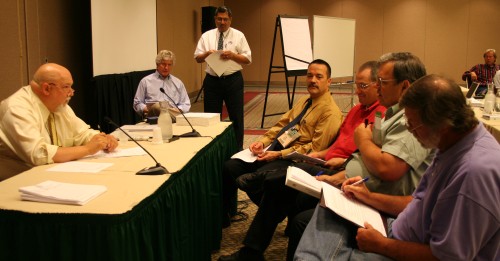
IAS eNews
BDA Lead Evaluator Course a Major Success
Representatives of the International Accreditation Service (IAS) Building Department Accreditation (BDA) Program conducted another “Lead Evaluator Course” in Minneapolis during the International Code Council’s Annual Conference. The course was again well-attended by building department professionals from across the United States as well from the United Arab Emirates (Dubai).
One of the primary strengths of the Building Department Accreditation Program is that it is a peer review process. The on-site pre-evaluations/full evaluations and the surveillance visits are conducted by building department professionals with impressive credentials. Typically, an evaluation team consists of an IAS-trained Lead Evaluator, an IAS staff team member and one or more subject-matter experts. Depending on the size of the jurisdiction being evaluated, more team members may be added to review department functions and to interview elected officials, department directors, department staff, and end-users such as Chamber of Commerce, Home Associations, contractors, design professionals and homeowners. Team members from various jurisdictions volunteer their time to participate in IAS accreditation on-site visits. The Lead Evaluator also oversees the final compilation of the workbook and issues reports to the jurisdiction, BDA staff, and to the IAS Board Committee on Accreditation. The fact that people of this caliber are willing to generously donate their time and talent to such an enterprise speaks volumes about the value of our program.
The Lead Evaluator Course provides a three-day overview of how to conduct a BDA on-site evaluation. There is a review of the workbook, which is directly based on the IAS Accreditation Criteria for Building Departments/Code Enforcement Agencies (AC251). Each criterion requires the jurisdiction to provide a written explanation of its processes or to provide supporting documentation to validate compliance. The team reviews this information and then conducts an on-site verification. Part of this involves staff interviews as well as observation of permitting, plan review and inspections. This is critical in making the determination as to which one of four possible categories applies to the department as regards each of the criterion: (1) In compliance (they have met the requirements); (2) Comment (this can be either citing good/best practices or a recommendation for discretionary changes); (3) Concern (recommendations for specific changes that need to be implemented prior to a surveillance visit one year after accreditation is achieved); and (4) Corrective Action Request [CAR] (definite changes that need to be implemented). Determining which of the four categories applies often leads to lively debate among course participants. Such a discussion provides an opportunity for course instructors to observe participants’ analytical abilities.
The first and second days of the class include homework assignments that are to be turned in the following morning. The homework assignments give insight as to how effective the students are in evaluating the information provided, as well as their ability to convey their findings in writing. This is very important since IAS written workbook reports are both a permanent record of the jurisdiction’s performance as well as a means to convey critical information to team members, department staff, members of the building department being evaluated, and also to the IAS Board Committee on Accreditation, which makes the final determination as to whether the jurisdiction should be awarded accreditation. Skills assessment is also done through a written examination that is given at the end of the course.
During the three-day course, members are divided into teams, much as they would be in the field, to collectively gather and assess information. These teams also conduct mock interviews of a mayor, city manager and chief building official. This exercise gives pointers on how to conduct an interview, how to ask questions, what questions to ask and how to effectively listen for pertinent information. The course also features a variety of speakers who provide additional perspectives regarding evaluating data, conducting interviews and other issues germane to BDA accreditation.
The response from those people that have taken the Lead Evaluator Course has been very positive. Many people believe it is a “tough course that was worth the time.” They believe it clarifies the program. Such clarification is particularly important, since many jurisdictions that are either about to apply or that are considering applying for accreditation use this course as a means to prepare their staff for the process. The jurisdictions want their own building departments to be fully prepared so that they can be successful in the accreditation evaluation.
The Lead Evaluator Course is offered free to International Code Council members. Those people who pass the course receive one Council CEU and may be eligible for other regional credits. The course is always given in conjunction with the Code Council’s Annual Conference and can also be offered as part of a Code Council Chapter activity. For more information, please contact Rick Archer at at 866-427-4422, ext. 3225.
 |
IAS President Chuck Ramani (standing) and Accreditation Specialist Rick Archer (seated left) with class participants during the IAS Building Department Accreditation Lead Evaluator training held during the Code Council's Annual Conference in Minneapolis. |
Testing Laboratories | Calibration Laboratories | Inspection Agencies | Special Inspection Agencies
Building Departments | Fabricators | Field Evaluation Bodies | Product Certification Agencies
Training Agencies | Curriculum Development | Metal Building Systems | Building Department Service Providers
Our parent company, the International Code Council
© 2008 International Accreditation Service